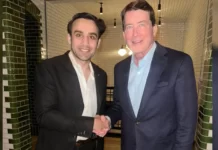What is a Hungarian psychologist turned business guru doing talking to startup founders in Karachi? For Gabor George Burt, the potential in emerging markets such as Pakistan aligns perfectly with his belief in the famous “Blue Ocean” philosophy of doing business.
Originally published in 2004, the book titled Blue Ocean Strategy that gave birth to this philosophy claims that instead of fighting for a share in an existing, crowded market, aspiring entrepreneurs should focus on creating a new, untapped market where there is no competition.
During his early career, Gabor George Burt was a recognised expert in Blue Ocean Strategy. But with his background in psychology, and a deep belief in the creative spirit and its potential in the world of business, Burt continued to tailor his own business philosophy. The result of that is his latest book titled “Slingshot Framework.” His work is driven by a simple belief. “The key to breakthrough innovation is reconnecting with the fearless imagination of childhood,” he tells Profit in an interview during his recent visit to Karachi. For Burt, the barriers that hold businesses back are often self-imposed and artificial. His life’s work, culminating in this book, encourages companies and countries to see limits as starting points for growth. But what does that mean, and how does he think his philosophy can help Pakistan?
From Budapest to Karachi
In a world where innovation is often associated with big risks and massive investments, Gabor George Burt offers a different message. His approach is rooted in childhood creativity, small steps, and rethinking boundaries. To hear him speak of it, his recent visit to Karachi was more than a book tour. It was a call for Pakistan’s entrepreneurs to turn their constraints into opportunities.
Born in Budapest and raised across different cultures, Burt’s journey from psychology to strategy shaped his ideas. His background in psychology gave him insights into human motivation and creative thinking. As he entered the world of business strategy, he became a recognized expert in Blue Ocean Strategy. But he knew there was more to explore.
“Blue Ocean’s limitation was its binary view: leave the ‘red ocean’ of competition to create a ‘blue ocean’ of new markets. But abandoning your current business is daunting.” In Slingshot Framework, Burt takes those core concepts and breaks them down. From Blue Oceans he introduces the concept of “Blue Lakes”—small, achievable innovations within existing operations. The goal is gradual change. Burt says, “First refresh your business, then expand, then pioneer entirely new spaces.” This phased approach makes innovation less intimidating and more practical.
His philosophy resonates especially in markets like Pakistan where resources are limited but creativity is abundant. Burt’s life and work demonstrate that limits can spark ingenuity. “Scarcity breeds ingenuity,” he notes. “In places like Pakistan, necessity pushes people to think differently.”
Reimagining Boundaries for Pakistan
Burt’s visit to Karachi was, in his own words, a revelation. During his travels he found Karachifull of energy. Startups, traditional industries, and young entrepreneurs are eager to innovate. But they face real challenges—funding, infrastructure, regulations, and a culture wary of disruption.
Burt sees these constraints differently. “Scarcity breeds creativity,” he says. “In Pakistan, limitations can be the seed for innovative solutions.” He points to microfinance as an example. “The microfinance revolution shows how resource constraints can lead to new ways of doing business. Entrepreneurs here are already demonstrating the Slingshot mindset. They are making small improvements that add up.”
He emphasizes that Pakistani businesses do not need to aim for dramatic disruptions. Instead, they can focus on Blue Lakes: small, strategic innovations that build momentum. It is an interesting message. Pakistan’s startups have regularly been accused of having lofty ambitions that they cannot stick to. It is a simple message that Burt wants to deliver. Perhaps it is made a little flashier or philosophical through his analogy but the point is the same: do what is achievable. For example, local fintech startups are improving services for rural communities. Burt suggests they should keep refining their offerings, gradually expanding their reach. “Innovation is a cycle,” he says. “Keep your customers engaged by constantly refreshing their experience.”
And it is not just entrepreneurs or startups on his radar. Burt’s ideas extend beyond business. He believes governments can also benefit from a *Slingshot* mindset. “Governments exist to serve their citizens,” he notes. “They should be thinking creatively about how to solve problems.” His work in countries like Malaysia and the Dominican Republic shows that even small projects can foster a culture of innovation.
In Pakistan, he sees potential for this approach in education, healthcare, and public services. “Ask yourself, what frustrates people?” Burt urges. “Then think about how to turn that frustration into delight.” He believes this citizen-centric approach can help rebuild trust and engagement in public institutions.
At the core of Burt’s philosophy is a simple truth. He says, “Creativity isn’t just about ideas. It’s about reconnecting with the fearless imagination we had as children.” Picasso’s famous quote—“Every child is an artist. The problem is to remain one as an adult”—captures this perfectly.
In Pakistan, where social norms often discourage risk-taking, nurturing that childhood playfulness could spark real change. Burt argues that innovation does not happen in one big leap. Instead, it is an ongoing process of small, continuous improvements. “It’s about cultivating a culture of reinvention,” he explains. “Keeping the spirit of childhood curiosity alive in business and society.”
Pakistan’s Potential
Burt’s Karachi visit was lively. Entrepreneurs and policymakers asked tough questions. Their enthusiasm was clear. Burt’s message resonated. “I am inspired by the hunger here,” he says. “Pakistan’s youth, its tech hubs, and its untapped markets are perfect for *Blue Lakes*—small steps that lead to big change.”
He sees Pakistan’s future as one of steady, phased innovations. “The country has the potential to aim higher,” Burt says. “It just needs to embrace constraints and see them as opportunities.” His own life journey—from Budapest to the global stage—is proof that boundaries are often self-imposed.
Will Burt’s Slingshot framework gain more attention in Pakistan? The book might offer some valuable lessons and a practical way forward. Focus on small, strategic innovations. Keep the cycle of reinvention going. And most important, remember that boundaries are only limits if you let them be.























